
目录
项目包含源码、调试、修改教程、调试教程、讲解视频、开发文档(项目摘要、前言、技术介绍、可行性分析、流程图、结构图、ER属性图、数据库表结构信息、功能介绍、测试致谢等约1万字)
数据库表有注释,可以导出数据字典及更新数据库时间,欢迎交流学习
中医药在线学习平台的设计背景
中医药在线学习平台的设计背景主要基于以下几个关键因素:
-
中医药文化的传承需求
中医药作为中国传统文化的重要组成部分,具有悠久的历史和深厚的理论基础。随着现代科技的发展,传统中医药知识的传承方式面临挑战,亟需通过数字化手段进行普及和推广。 -
在线教育的普及与便捷性
互联网技术的快速发展使得在线教育成为主流学习方式之一。通过在线平台,学习者可以随时随地获取中医药知识,突破时间和空间的限制,提高学习效率。 -
技术栈的成熟与可行性
Python 和 Vue.js 作为当前流行的技术组合,能够高效支撑平台开发。Python 在后端数据处理和算法实现方面具有优势,而 Vue.js 在前端交互和用户体验方面表现优异,二者结合可以构建功能完善、性能稳定的学习平台。 -
政策支持与行业发展
-
近年来,国家对中医药事业的支持力度不断加大,相关政策鼓励中医药知识的数字化传播。同时,中医药行业的发展也推动了相关教育资源的线上化进程。
平台的技术实现背景
-
Python 作为后端技术
Python 因其简洁的语法和丰富的库支持,成为后端开发的理想选择。Django 框架可以快速搭建稳定的后端服务,处理用户请求、数据存储和业务逻辑。 -
Vue.js 作为前端框架
Vue.js 的响应式特性和组件化开发模式,能够高效构建用户界面。结合 Element UI 等组件库,可以快速实现美观且功能丰富的前端页面。 -
数据库与数据处理
平台通常采用 MySQL 作为数据库,存储用户信息、学习资源和交互数据。Python 的数据分析库(如 Pandas)可用于处理学习行为数据,优化推荐算法。 -
RESTful API 设计
前后端通过 RESTful API 进行通信,确保数据交互的规范性和安全性。Python 后端提供接口,Vue.js 前端调用并展示数据。
平台的功能设计背景
-
课程管理与学习资源
平台需要支持课程分类、视频播放、文档下载等功能,方便用户系统学习中医药知识。Python 可以高效管理资源,Vue.js 实现动态加载和展示。 -
用户交互与社区功能
通过论坛、问答等功能,用户可以进行知识分享和交流。Vue.js 的实时更新特性能够提升社区互动的体验。 -
数据分析与智能推荐
Python 的机器学习库(如 Scikit-learn)可用于分析用户学习行为,实现个性化推荐,帮助用户高效学习。 -
移动端适配
Vue.js 的响应式设计能够适配不同设备,确保用户在手机、平板等移动端也能流畅使用平台。
一、整体目录:
项目包含源码、调试、修改教程、调试教程、讲解视频、开发文档(项目摘要、前言、技术介绍、可行性分析、流程图、结构图、ER属性图、数据库表结构信息、功能介绍、测试致谢等约1万字)
二、运行截图
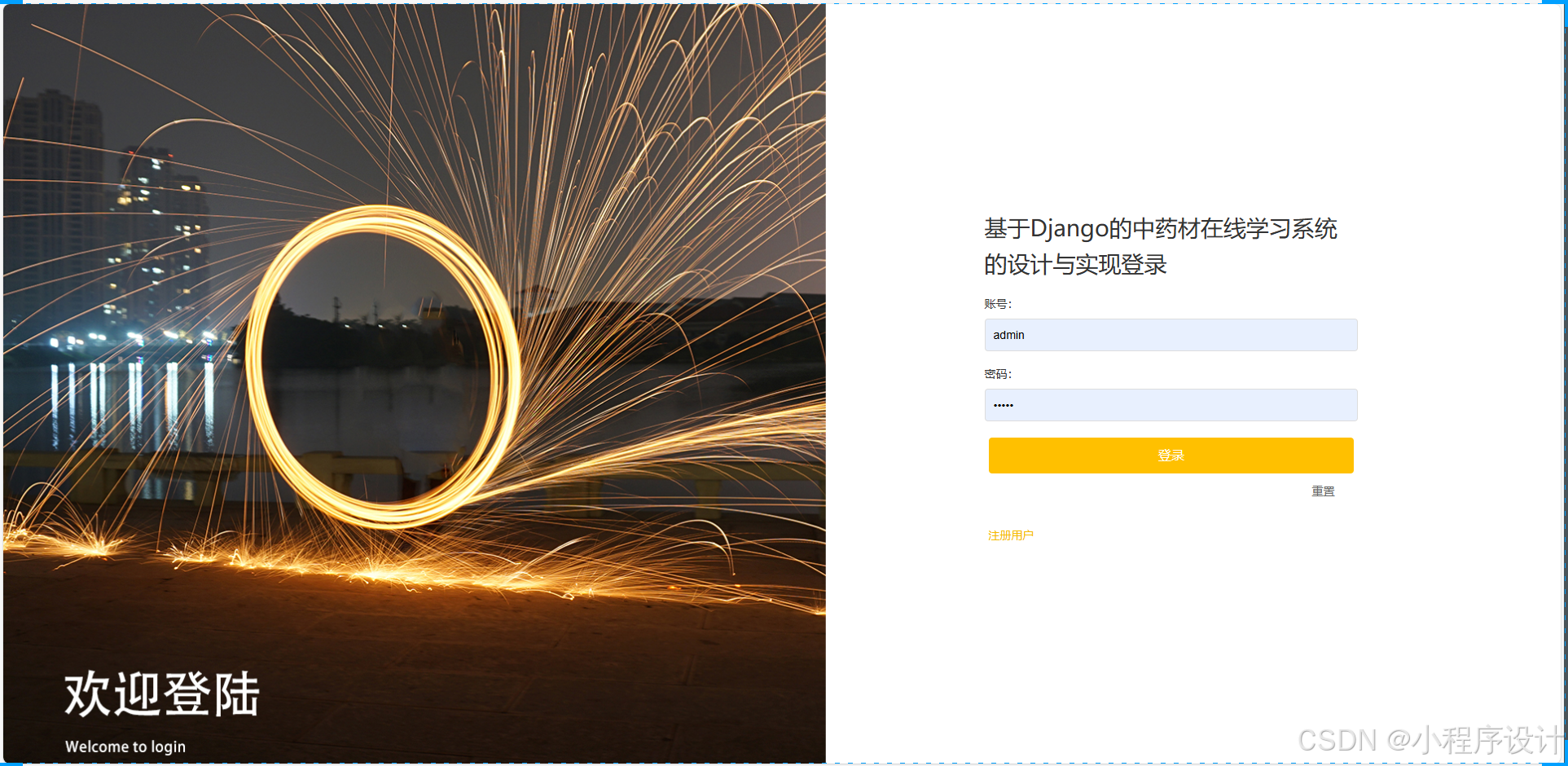

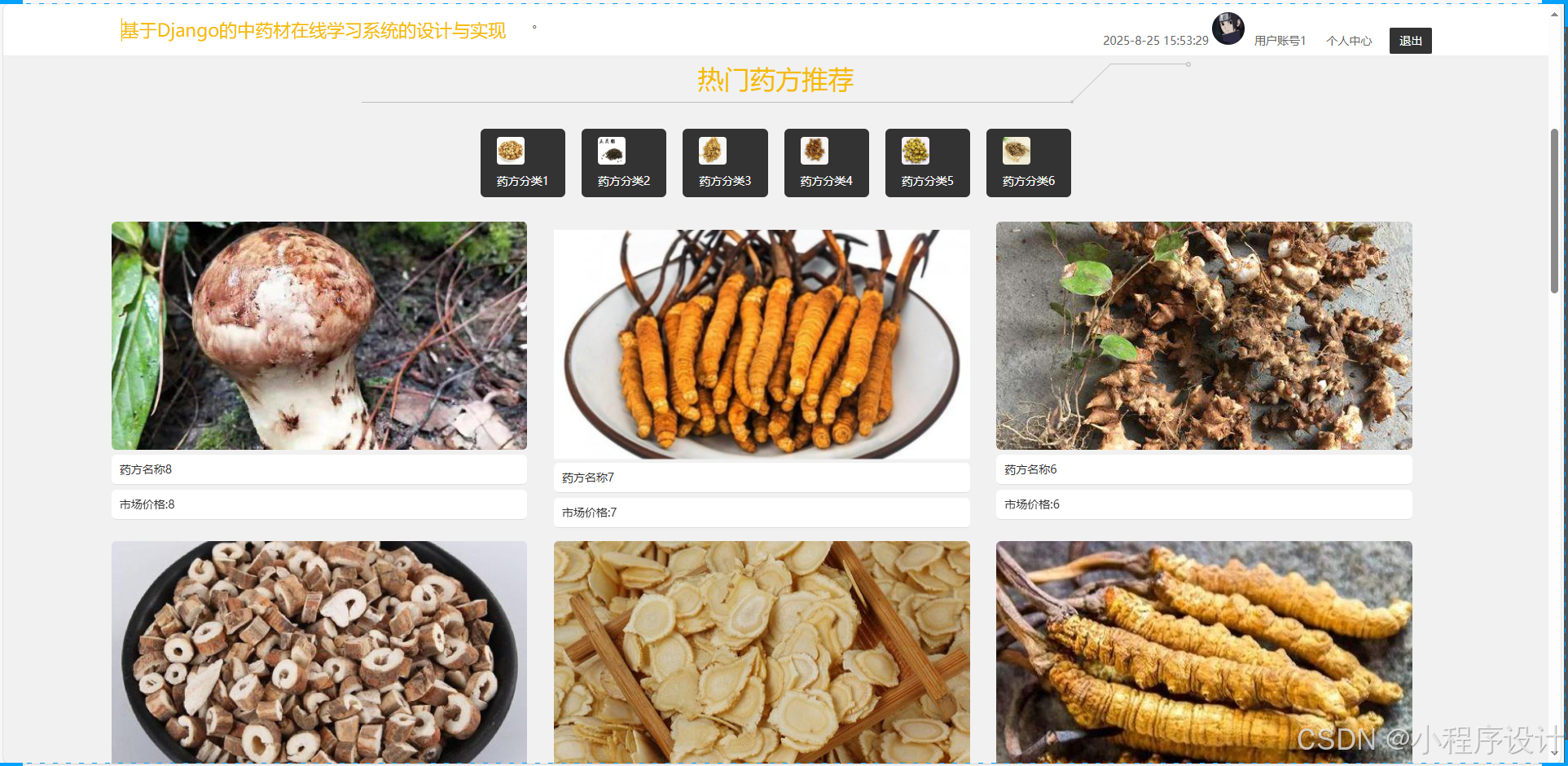
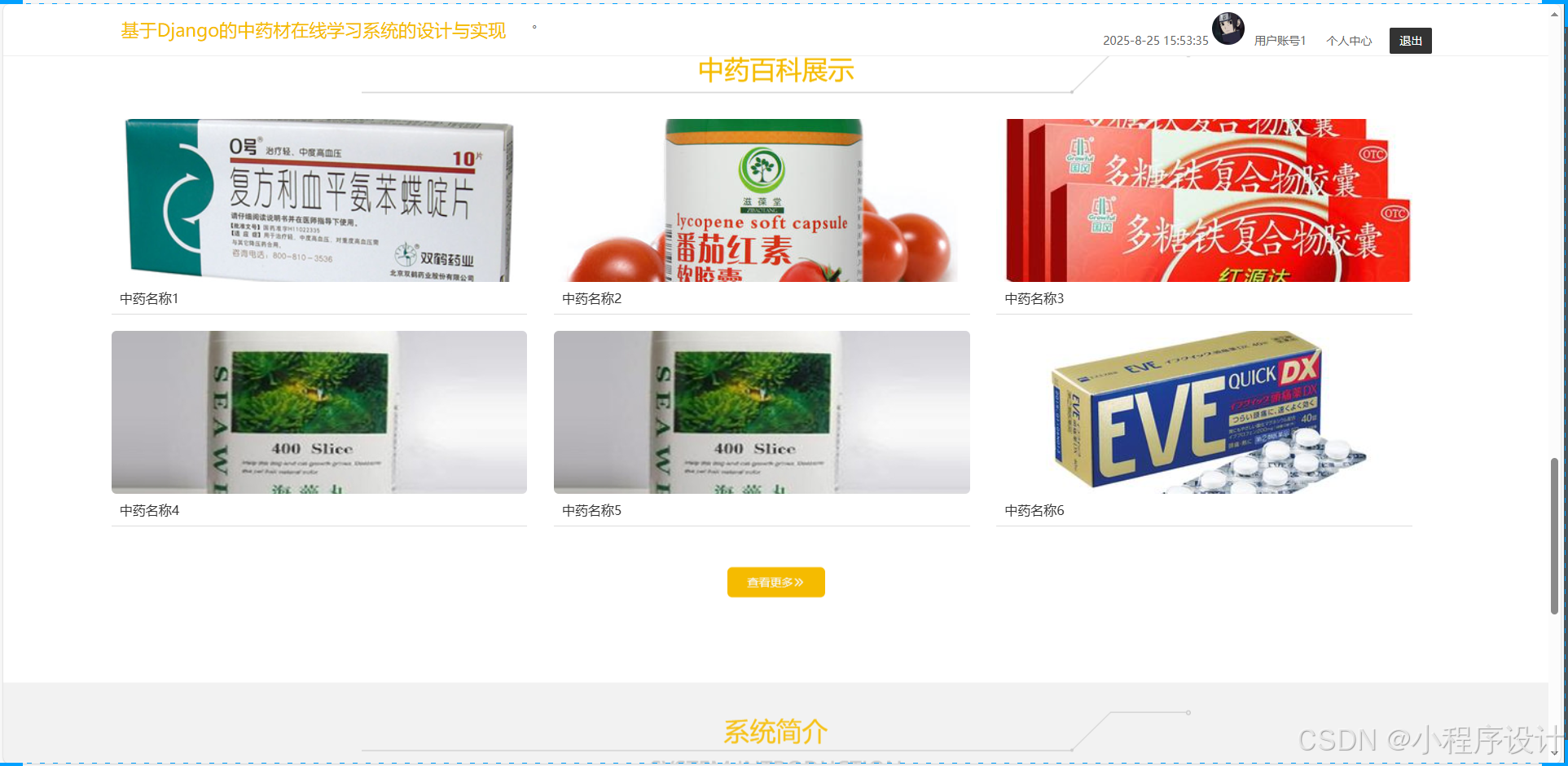
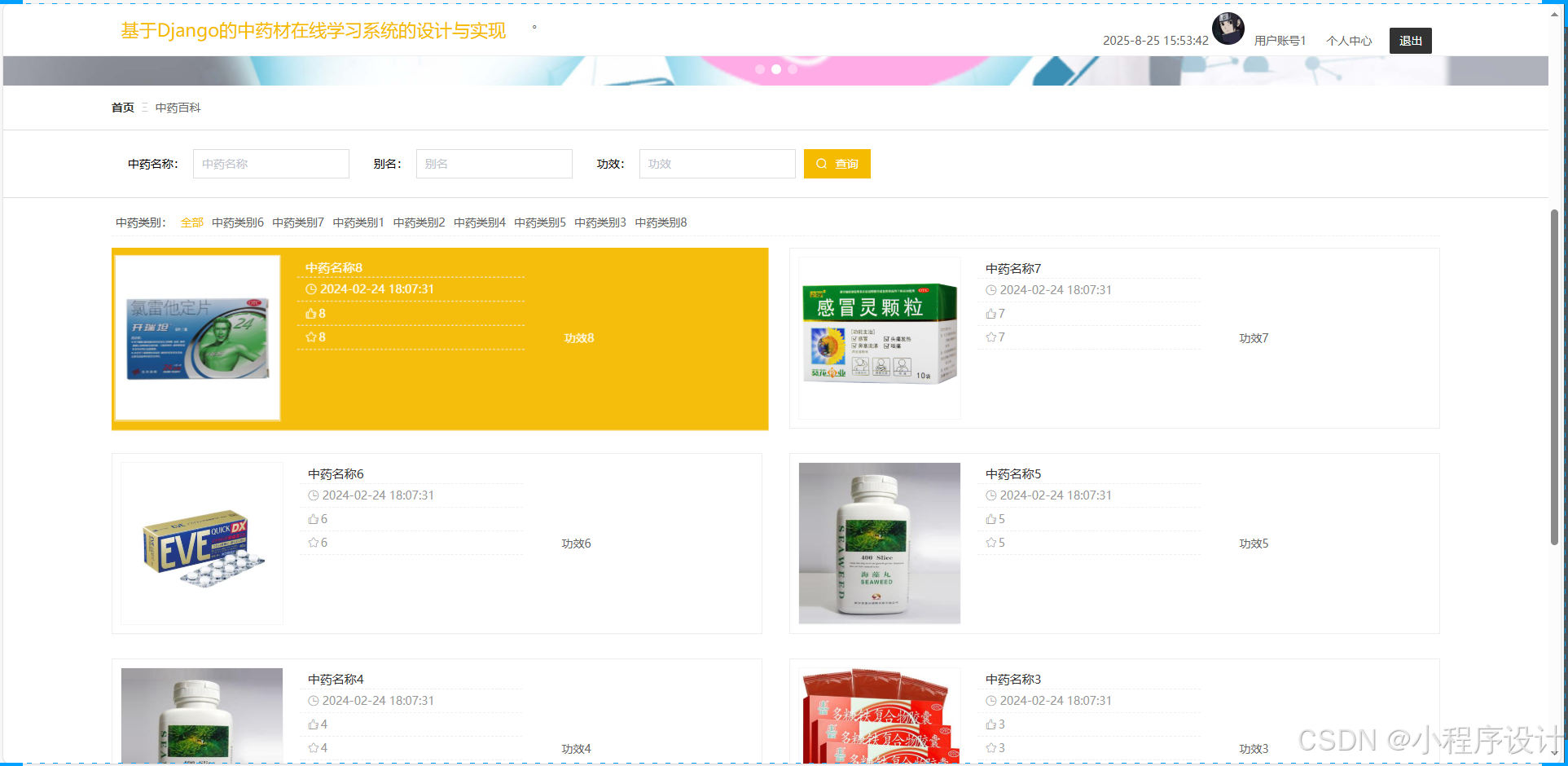
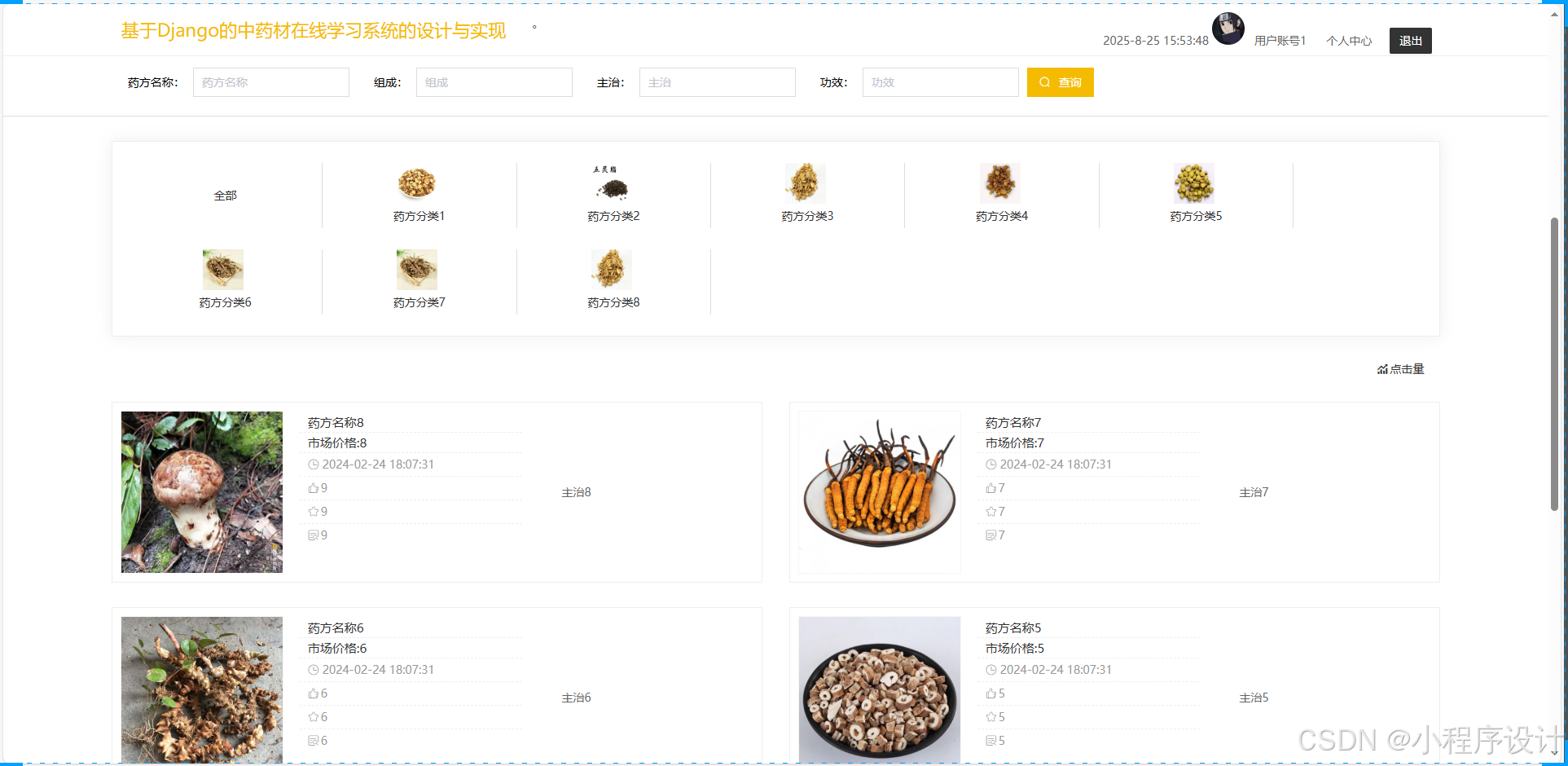
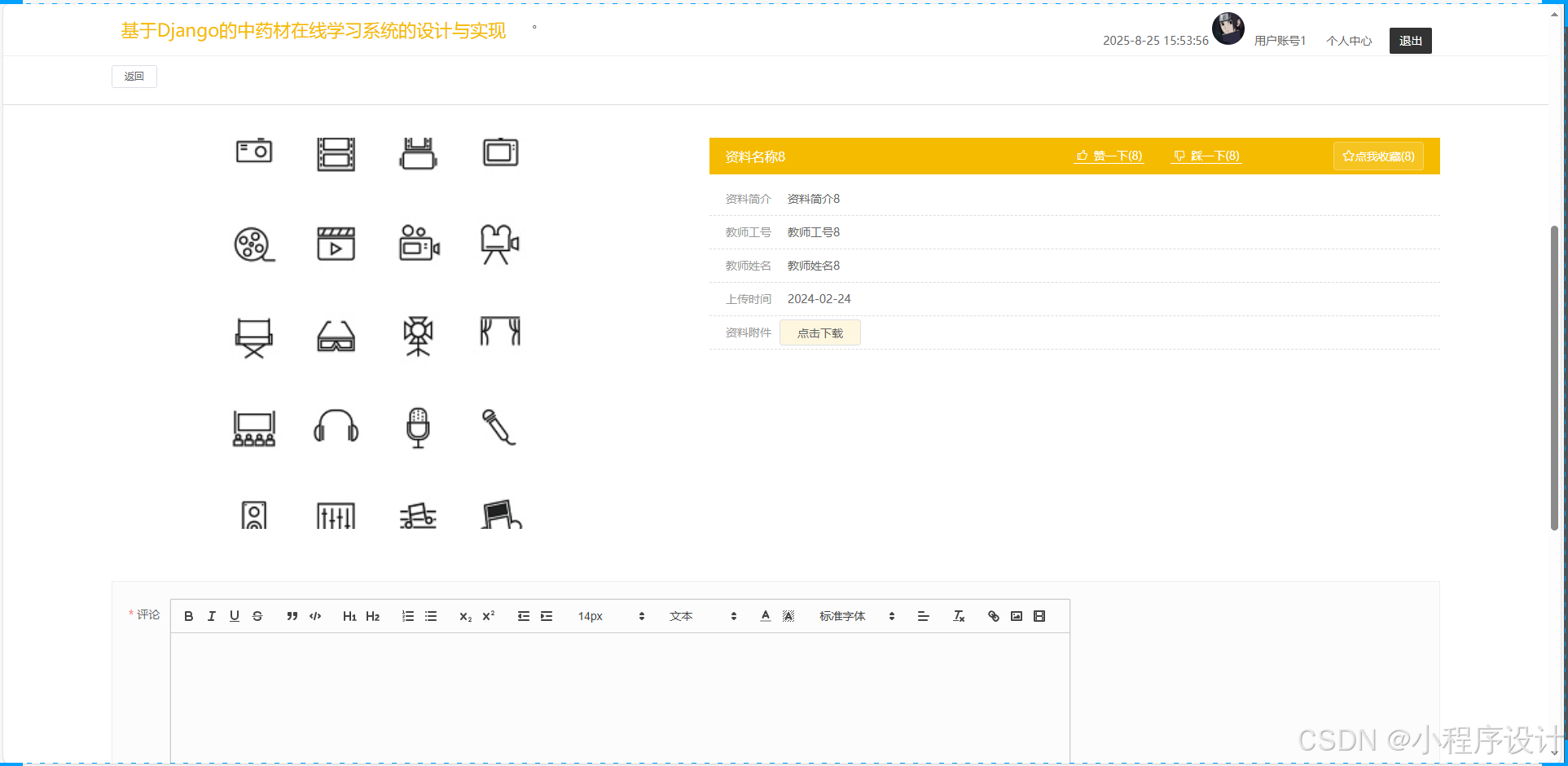
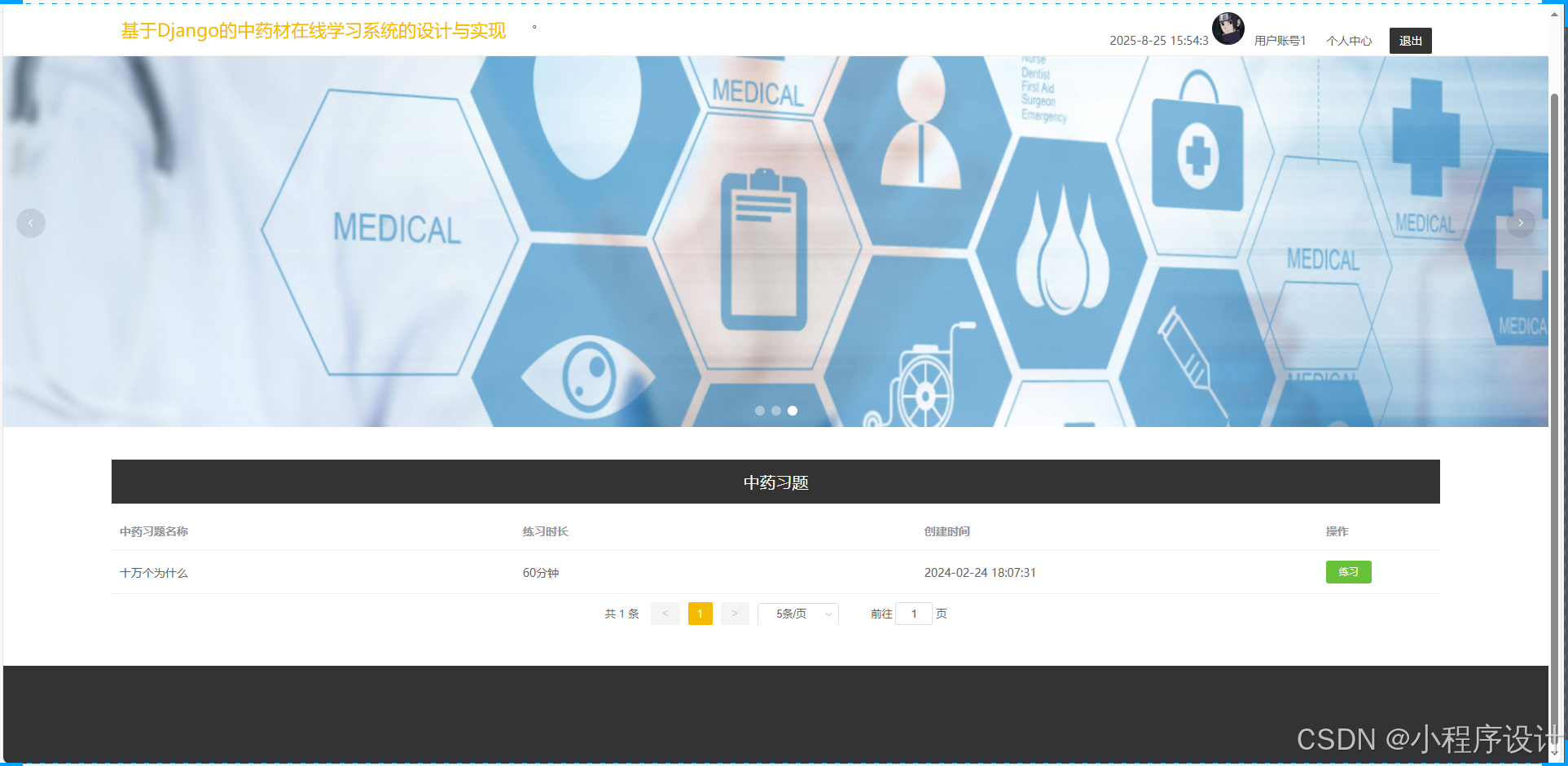
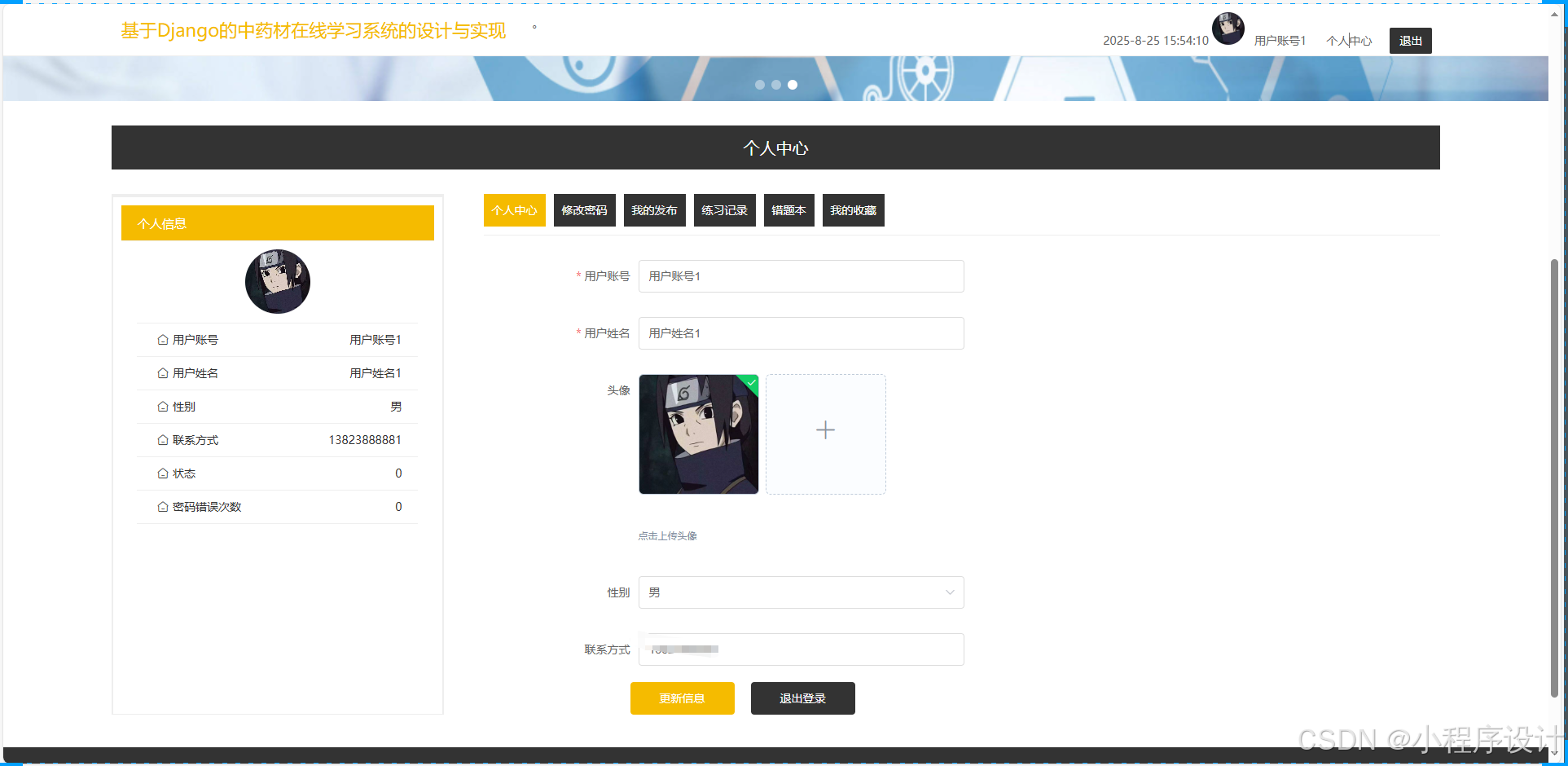

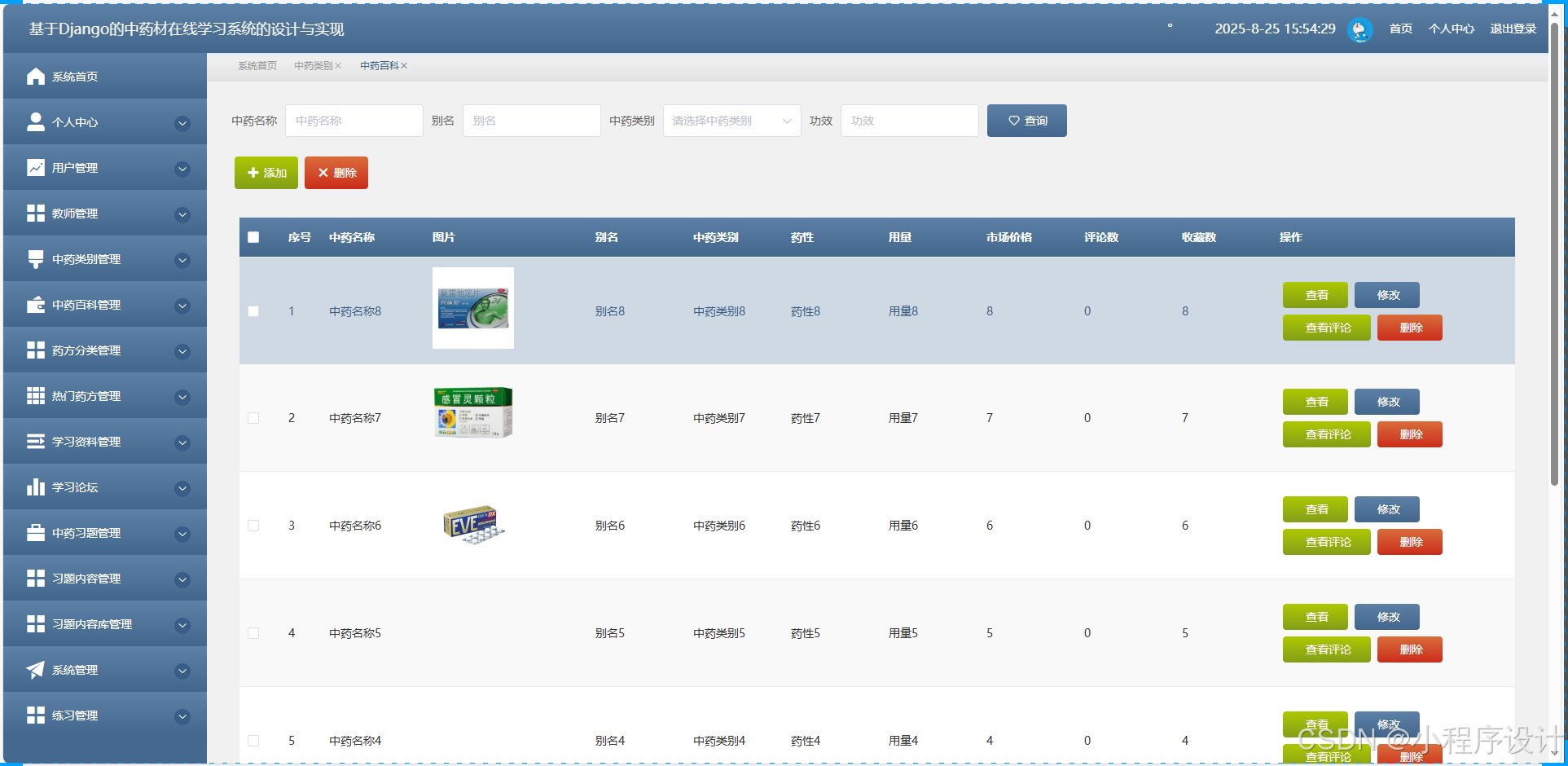
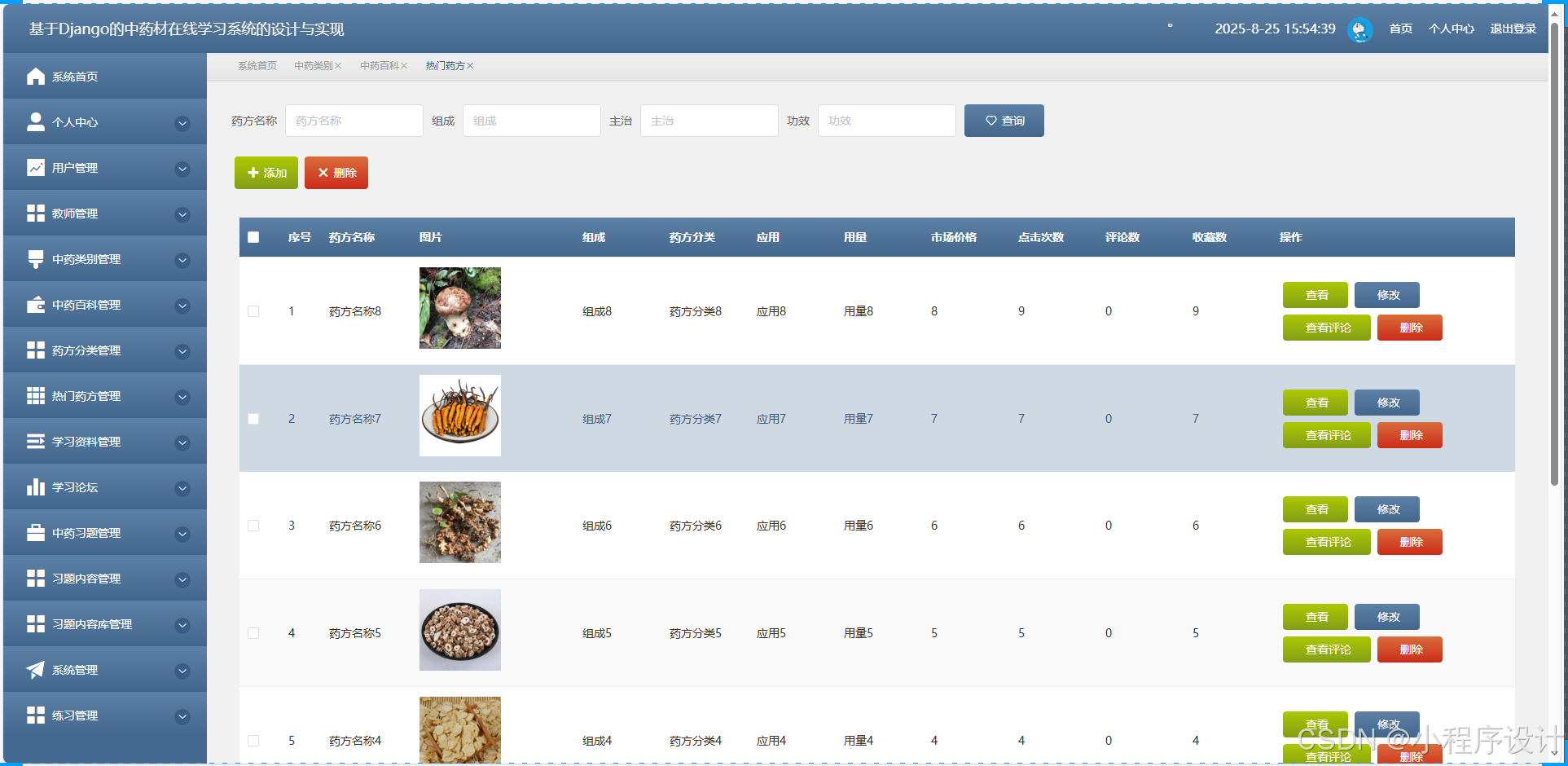
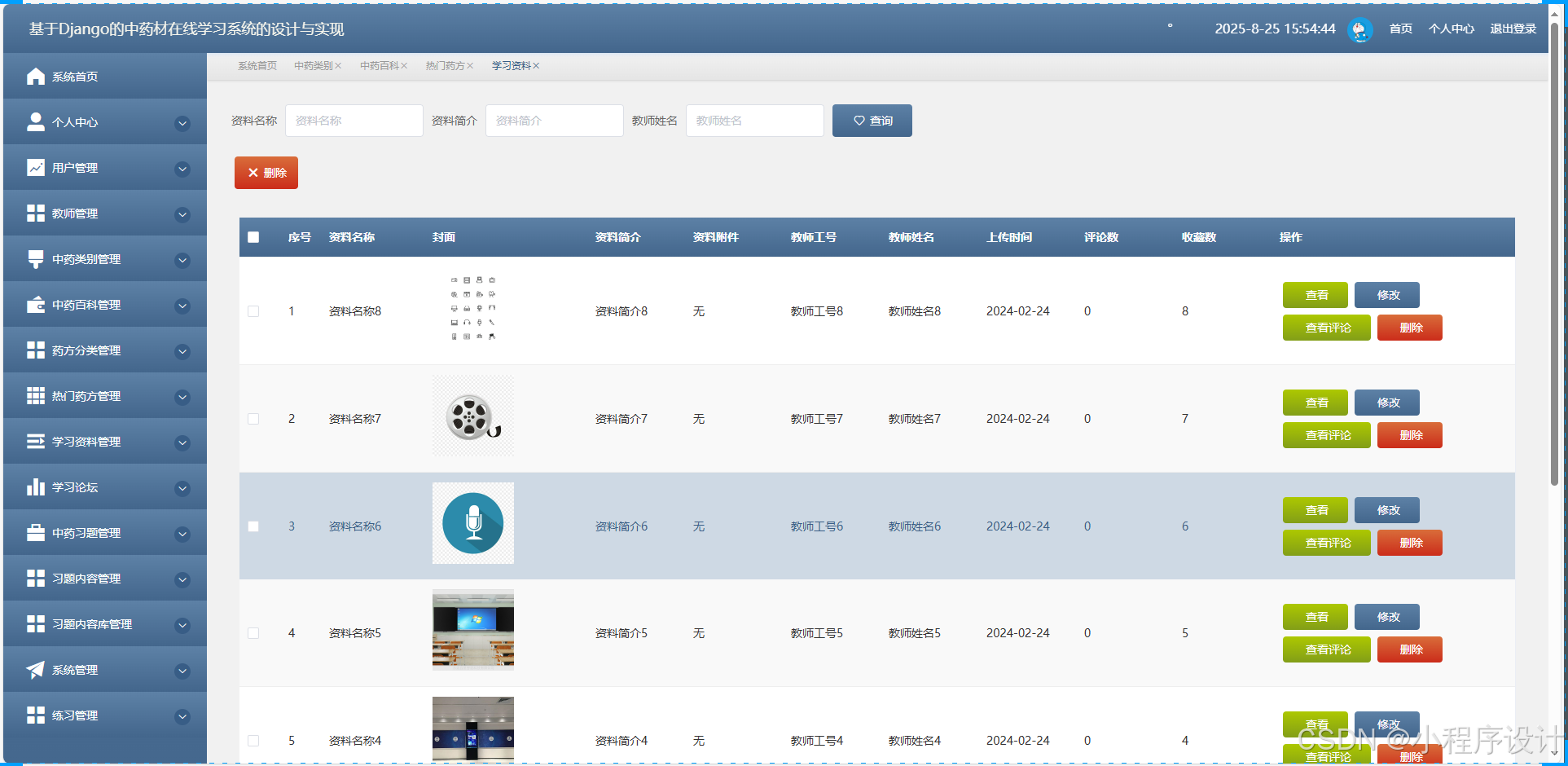
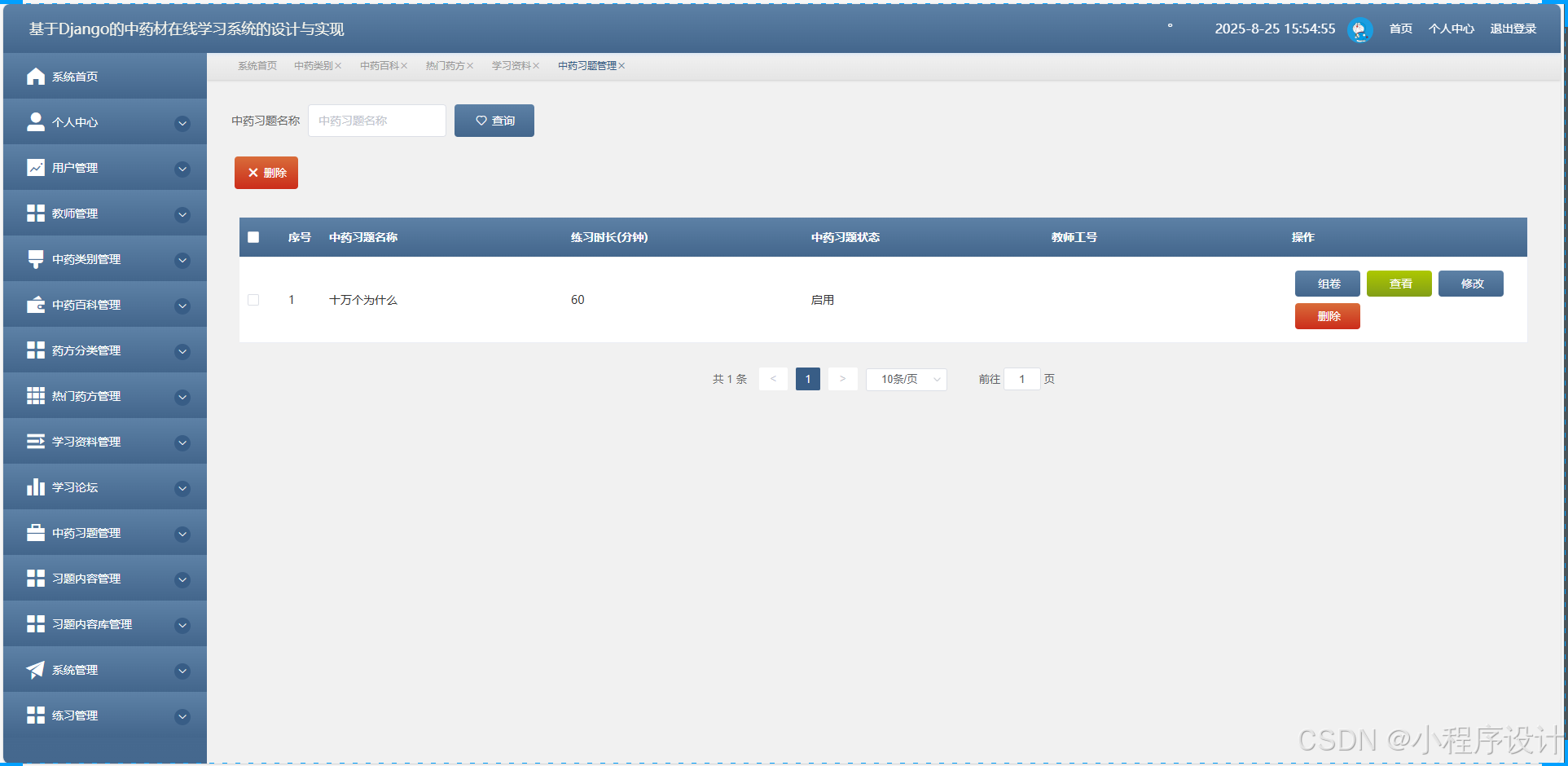
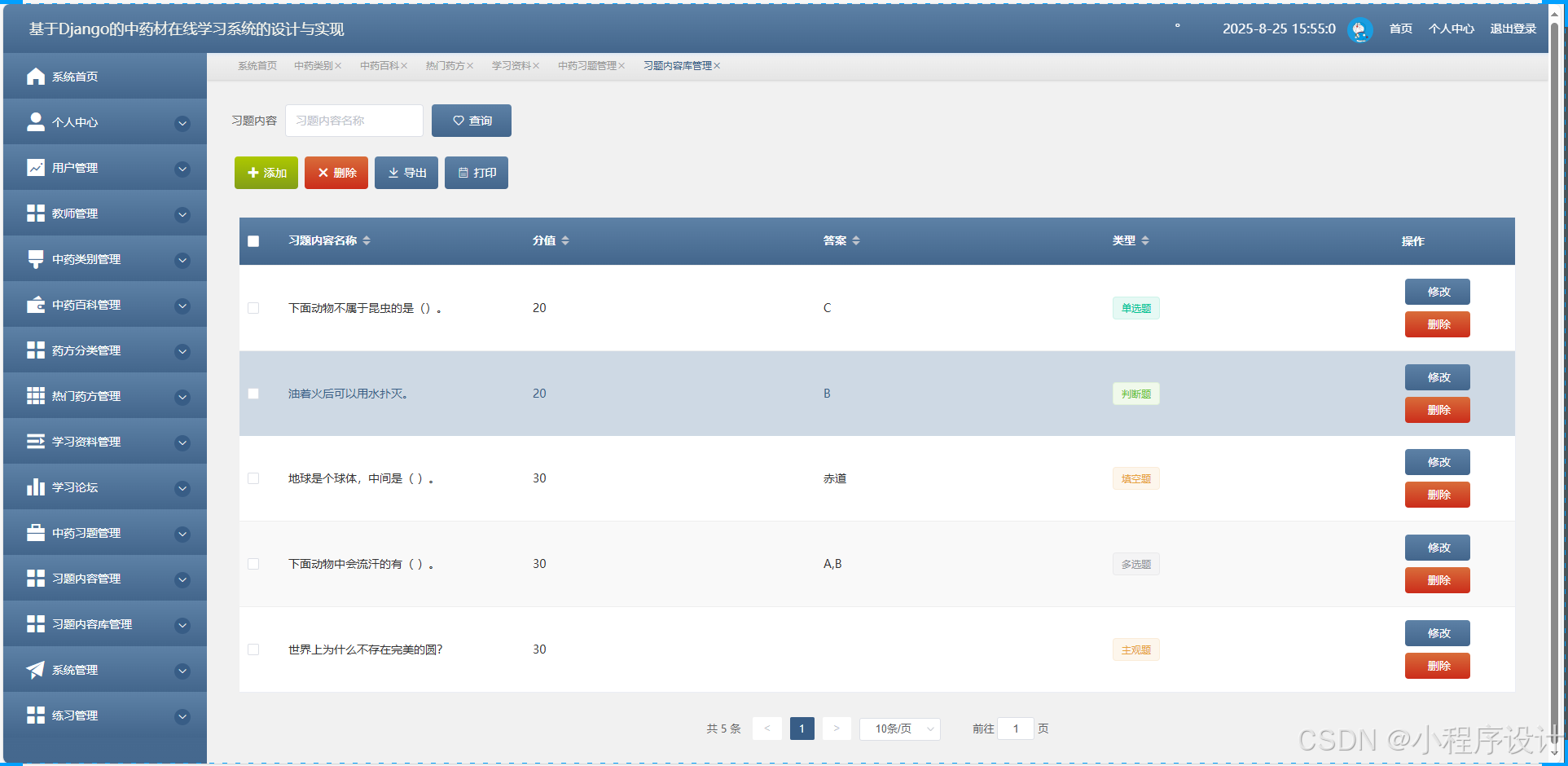
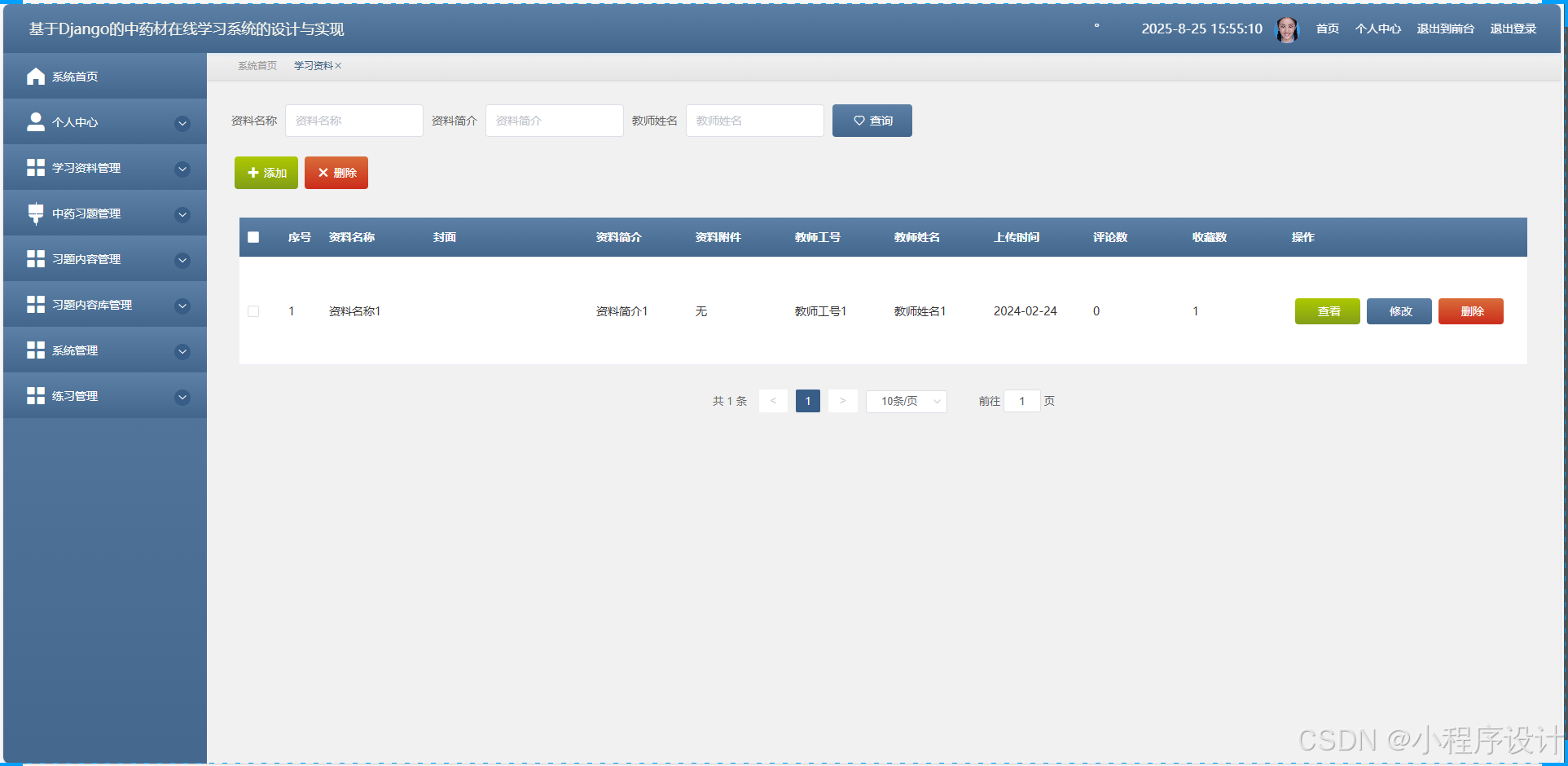
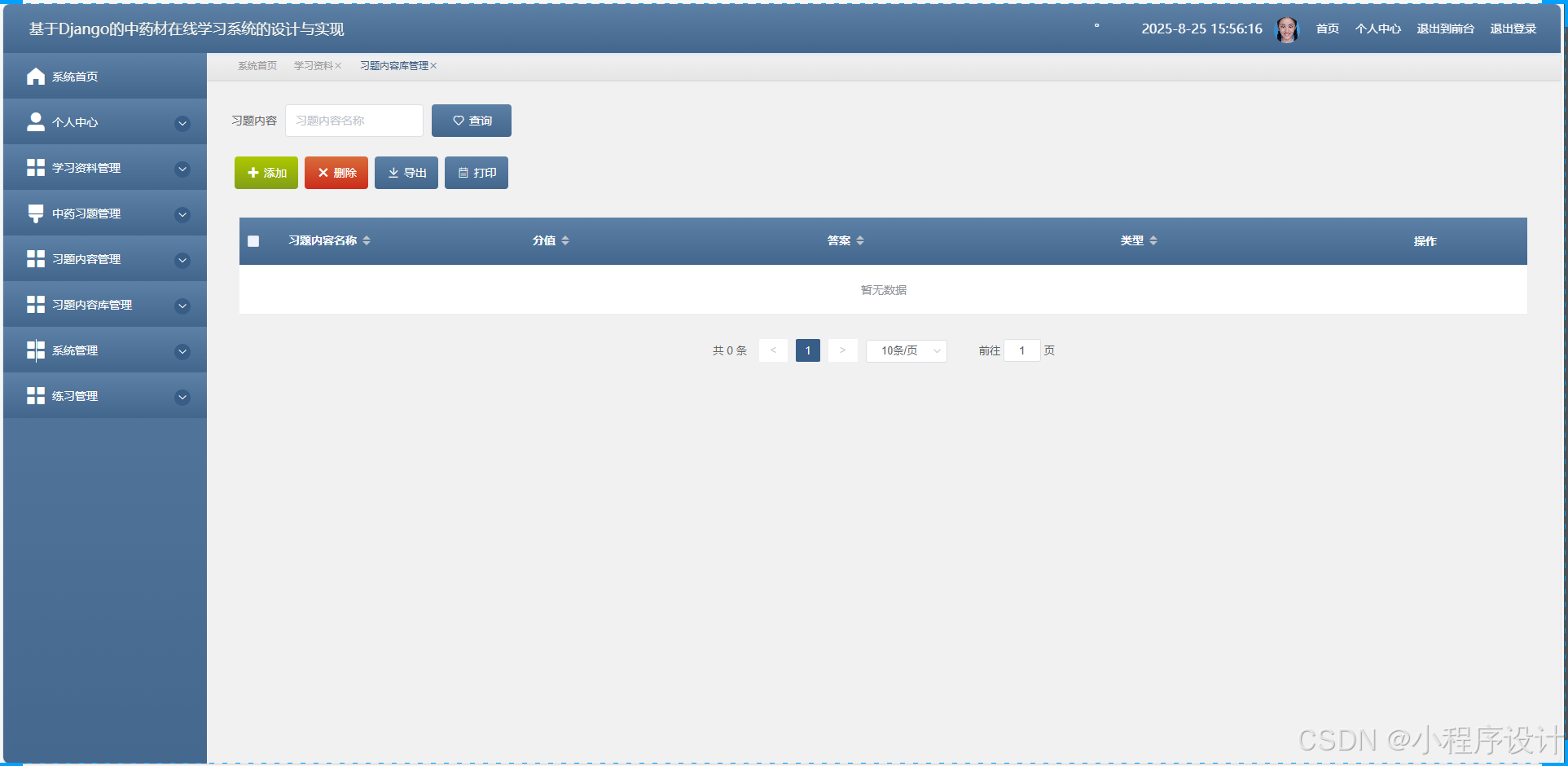
三、代码部分(示范):
商品推荐、内容推荐算法
#coding:utf-8
__author__ = "ila"
import base64, copy, logging, os, sys, time, xlrd, json, datetime, configparser
from django.http import JsonResponse
from django.apps import apps
from django.db.models.aggregates import Count,Sum
from .models import yonghu
from util.codes import *
from util.auth import Auth
from util.common import Common
import util.message as mes
from django.db import connection
import random
from django.core.mail import send_mail
from django.conf import settings
from django.shortcuts import redirect
from django.db.models import Q
from util.baidubce_api import BaiDuBce
from .config_model import config
def yonghu_register(request):
if request.method in ["POST", "GET"]:
msg = {'code': normal_code, "msg": mes.normal_code}
req_dict = request.session.get("req_dict")
error = yonghu.createbyreq(yonghu, yonghu, req_dict)
if error != None:
msg['code'] = crud_error_code
msg['msg'] = "用户已存在,请勿重复注册!"
return JsonResponse(msg)
def yonghu_login(request):
if request.method in ["POST", "GET"]:
msg = {'code': normal_code, "msg": mes.normal_code}
req_dict = request.session.get("req_dict")
datas = yonghu.getbyparams(yonghu, yonghu, req_dict)
if not datas:
msg['code'] = password_error_code
msg['msg'] = mes.password_error_code
return JsonResponse(msg)
try:
__sfsh__= yonghu.__sfsh__
except:
__sfsh__=None
if __sfsh__=='是':
if datas[0].get('sfsh')!='是':
msg['code']=other_code
msg['msg'] = "账号已锁定,请联系管理员审核!"
return JsonResponse(msg)
req_dict['id'] = datas[0].get('id')
return Auth.authenticate(Auth, yonghu, req_dict)
def yonghu_logout(request):
if request.method in ["POST", "GET"]:
msg = {
"msg": "登出成功",
"code": 0
}
return JsonResponse(msg)
def yonghu_resetPass(request):
'''
'''
if request.method in ["POST", "GET"]:
msg = {"code": normal_code, "msg": mes.normal_code}
req_dict = request.session.get("req_dict")
columns= yonghu.getallcolumn( yonghu, yonghu)
try:
__loginUserColumn__= yonghu.__loginUserColumn__
except:
__loginUserColumn__=None
username=req_dict.get(list(req_dict.keys())[0])
if __loginUserColumn__:
username_str=__loginUserColumn__
else:
username_str=username
if 'mima' in columns:
password_str='mima'
else:
password_str='password'
init_pwd = '123456'
recordsParam = {}
recordsParam[username_str] = req_dict.get("username")
records=yonghu.getbyparams(yonghu, yonghu, recordsParam)
if len(records)<1:
msg['code'] = 400
msg['msg'] = '用户不存在'
return JsonResponse(msg)
eval('''yonghu.objects.filter({}='{}').update({}='{}')'''.format(username_str,username,password_str,init_pwd))
return JsonResponse(msg)
def yonghu_session(request):
'''
'''
if request.method in ["POST", "GET"]:
msg = {"code": normal_code,"msg": mes.normal_code, "data": {}}
req_dict={"id":request.session.get('params').get("id")}
msg['data'] = yonghu.getbyparams(yonghu, yonghu, req_dict)[0]
return JsonResponse(msg)
def yonghu_default(request):
if request.method in ["POST", "GET"]:
msg = {"code": normal_code,"msg": mes.normal_code, "data": {}}
req_dict = request.session.get("req_dict")
req_dict.update({"isdefault":"是"})
data=yonghu.getbyparams(yonghu, yonghu, req_dict)
if len(data)>0:
msg['data'] = data[0]
else:
msg['data'] = {}
return JsonResponse(msg)
def yonghu_page(request):
'''
'''
if request.method in ["POST", "GET"]:
msg = {"code": normal_code, "msg": mes.normal_code, "data":{"currPage":1,"totalPage":1,"total":1,"pageSize":10,"list":[]}}
req_dict = request.session.get("req_dict")
#获取全部列名
columns= yonghu.getallcolumn( yonghu, yonghu)
#当前登录用户所在表
tablename = request.session.get("tablename")
#authColumn=list(__authTables__.keys())[0]
#authTable=__authTables__.get(authColumn)
# if authTable==tablename:
#params = request.session.get("params")
#req_dict[authColumn]=params.get(authColumn)
'''__authSeparate__此属性为真,params添加userid,后台只查询个人数据'''
try:
__authSeparate__=yonghu.__authSeparate__
except:
__authSeparate__=None
if __authSeparate__=="是":
tablename=request.session.get("tablename")
if tablename!="users" and 'userid' in columns:
try:
req_dict['userid']=request.session.get("params").get("id")
except:
pass
#当项目属性hasMessage为”是”,生成系统自动生成留言板的表messages,同时该表的表属性hasMessage也被设置为”是”,字段包括userid(用户id),username(用户名),content(留言内容),reply(回复)
#接口page需要区分权限,普通用户查看自己的留言和回复记录,管理员查看所有的留言和回复记录
try:
__hasMessage__=yonghu.__hasMessage__
except:
__hasMessage__=None
if __hasMessage__=="是":
tablename=request.session.get("tablename")
if tablename!="users":
req_dict["userid"]=request.session.get("params").get("id")
# 判断当前表的表属性isAdmin,为真则是管理员表
# 当表属性isAdmin=”是”,刷出来的用户表也是管理员,即page和list可以查看所有人的考试记录(同时应用于其他表)
__isAdmin__ = None
allModels = apps.get_app_config('main').get_models()
for m in allModels:
if m.__tablename__==tablename:
try:
__isAdmin__ = m.__isAdmin__
except:
__isAdmin__ = None
break
# 当前表也是有管理员权限的表
if __isAdmin__ == "是" and 'yonghu' != 'forum':
if req_dict.get("userid") and 'yonghu' != 'chat':
del req_dict["userid"]
else:
#非管理员权限的表,判断当前表字段名是否有userid
if tablename!="users" and 'yonghu'[:7]!='discuss'and "userid" in yonghu.getallcolumn(yonghu,yonghu):
req_dict["userid"] = request.session.get("params").get("id")
#当列属性authTable有值(某个用户表)[该列的列名必须和该用户表的登陆字段名一致],则对应的表有个隐藏属性authTable为”是”,那么该用户查看该表信息时,只能查看自己的
try:
__authTables__=yonghu.__authTables__
except:
__authTables__=None
if __authTables__!=None and __authTables__!={} and __isAdmin__ == "是":
try:
del req_dict['userid']
# tablename=request.session.get("tablename")
# if tablename=="users":
# del req_dict['userid']
except:
pass
for authColumn,authTable in __authTables__.items():
if authTable==tablename:
params = request.session.get("params")
req_dict[authColumn]=params.get(authColumn)
username=params.get(authColumn)
break
q = Q()
msg['data']['list'], msg['data']['currPage'], msg['data']['totalPage'], msg['data']['total'], \
msg['data']['pageSize'] =yonghu.page(yonghu, yonghu, req_dict, request, q)
return JsonResponse(msg)
def yonghu_autoSort(request):
'''
.智能推荐功能(表属性:[intelRecom(是/否)],新增clicktime[前端不显示该字段]字段(调用info/detail接口的时候更新),按clicktime排序查询)
主要信息列表(如商品列表,新闻列表)中使用,显示最近点击的或最新添加的5条记录就行
'''
if request.method in ["POST", "GET"]:
msg = {"code": normal_code, "msg": mes.normal_code, "data":{"currPage":1,"totalPage":1,"total":1,"pageSize":10,"list":[]}}
req_dict = request.session.get("req_dict")
if "clicknum" in yonghu.getallcolumn(yonghu,yonghu):
req_dict['sort']='clicknum'
elif "browseduration" in yonghu.getallcolumn(yonghu,yonghu):
req_dict['sort']='browseduration'
else:
req_dict['sort']='clicktime'
req_dict['order']='desc'
msg['data']['list'], msg['data']['currPage'], msg['data']['totalPage'], msg['data']['total'], \
msg['data']['pageSize'] = yonghu.page(yonghu,yonghu, req_dict)
return JsonResponse(msg)
def yonghu_list(request):
'''
前台分页
'''
if request.method in ["POST", "GET"]:
msg = {"code": normal_code, "msg": mes.normal_code, "data":{"currPage":1,"totalPage":1,"total":1,"pageSize":10,"list":[]}}
req_dict = request.session.get("req_dict")
if req_dict.__contains__('vipread'):
del req_dict['vipread']
#获取全部列名
columns= yonghu.getallcolumn( yonghu, yonghu)
#表属性[foreEndList]前台list:和后台默认的list列表页相似,只是摆在前台,否:指没有此页,是:表示有此页(不需要登陆即可查看),前要登:表示有此页且需要登陆后才能查看
try:
__foreEndList__=yonghu.__foreEndList__
except:
__foreEndList__=None
if __foreEndList__=="前要登":
tablename=request.session.get("tablename")
if tablename!="users" and 'userid' in columns:
try:
req_dict['userid']=request.session.get("params").get("id")
except:
pass
#forrEndListAuth
try:
__foreEndListAuth__=yonghu.__foreEndListAuth__
except:
__foreEndListAuth__=None
#authSeparate
try:
__authSeparate__=yonghu.__authSeparate__
except:
__authSeparate__=None
if __foreEndListAuth__ =="是" and __authSeparate__=="是":
tablename=request.session.get("tablename")
if tablename!="users":
req_dict['userid']=request.session.get("params",{"id":0}).get("id")
tablename = request.session.get("tablename")
if tablename == "users" and req_dict.get("userid") != None:#判断是否存在userid列名
del req_dict["userid"]
else:
__isAdmin__ = None
allModels = apps.get_app_config('main').get_models()
for m in allModels:
if m.__tablename__==tablename:
try:
__isAdmin__ = m.__isAdmin__
except:
__isAdmin__ = None
break
if __isAdmin__ == "是":
if req_dict.get("userid"):
# del req_dict["userid"]
pass
else:
#非管理员权限的表,判断当前表字段名是否有userid
if "userid" in columns:
try:
pass
except:
pass
#当列属性authTable有值(某个用户表)[该列的列名必须和该用户表的登陆字段名一致],则对应的表有个隐藏属性authTable为”是”,那么该用户查看该表信息时,只能查看自己的
try:
__authTables__=yonghu.__authTables__
except:
__authTables__=None
if __authTables__!=None and __authTables__!={} and __foreEndListAuth__=="是":
try:
del req_dict['userid']
except:
pass
for authColumn,authTable in __authTables__.items():
if authTable==tablename:
params = request.session.get("params")
req_dict[authColumn]=params.get(authColumn)
username=params.get(authColumn)
break
if yonghu.__tablename__[:7]=="discuss":
try:
del req_dict['userid']
except:
pass
q = Q()
msg['data']['list'], msg['data']['currPage'], msg['data']['totalPage'], msg['data']['total'], \
msg['data']['pageSize'] = yonghu.page(yonghu, yonghu, req_dict, request, q)
return JsonResponse(msg)
def yonghu_save(request):
'''
后台新增
'''
if request.method in ["POST", "GET"]:
msg = {"code": normal_code, "msg": mes.normal_code, "data": {}}
req_dict = request.session.get("req_dict")
if 'clicktime' in req_dict.keys():
del req_dict['clicktime']
tablename=request.session.get("tablename")
__isAdmin__ = None
allModels = apps.get_app_config('main').get_models()
for m in allModels:
if m.__tablename__==tablename:
try:
__isAdmin__ = m.__isAdmin__
except:
__isAdmin__ = None
break
#获取全部列名
columns= yonghu.getallcolumn( yonghu, yonghu)
if tablename!='users' and req_dict.get("userid")!=None and 'userid' in columns and __isAdmin__!='是':
params=request.session.get("params")
req_dict['userid']=params.get('id')
if 'addtime' in req_dict.keys():
del req_dict['addtime']
error= yonghu.createbyreq(yonghu,yonghu, req_dict)
if error!=None:
msg['code'] = crud_error_code
msg['msg'] = error
return JsonResponse(msg)
def yonghu_add(request):
'''
前台新增
'''
if request.method in ["POST", "GET"]:
msg = {"code": normal_code, "msg": mes.normal_code, "data": {}}
req_dict = request.session.get("req_dict")
#获取全部列名
columns= yonghu.getallcolumn( yonghu, yonghu)
try:
__authSeparate__=yonghu.__authSeparate__
except:
__authSeparate__=None
if __authSeparate__=="是":
tablename=request.session.get("tablename")
if tablename!="users" and 'userid' in columns:
try:
req_dict['userid']=request.session.get("params").get("id")
except:
pass
try:
__foreEndListAuth__=yonghu.__foreEndListAuth__
except:
__foreEndListAuth__=None
if __foreEndListAuth__ and __foreEndListAuth__!="否":
tablename=request.session.get("tablename")
if tablename!="users":
req_dict['userid']=request.session.get("params").get("id")
if 'addtime' in req_dict.keys():
del req_dict['addtime']
error= yonghu.createbyreq(yonghu,yonghu, req_dict)
if error!=None:
msg['code'] = crud_error_code
msg['msg'] = error
return JsonResponse(msg)
def yonghu_thumbsup(request,id_):
'''
点赞:表属性thumbsUp[是/否],刷表新增thumbsupnum赞和crazilynum踩字段,
'''
if request.method in ["POST", "GET"]:
msg = {"code": normal_code, "msg": mes.normal_code, "data": {}}
req_dict = request.session.get("req_dict")
id_=int(id_)
type_=int(req_dict.get("type",0))
rets=yonghu.getbyid(yonghu,yonghu,id_)
update_dict={
"id":id_,
}
if type_==1:#赞
update_dict["thumbsupnum"]=int(rets[0].get('thumbsupnum'))+1
elif type_==2:#踩
update_dict["crazilynum"]=int(rets[0].get('crazilynum'))+1
error = yonghu.updatebyparams(yonghu,yonghu, update_dict)
if error!=None:
msg['code'] = crud_error_code
msg['msg'] = error
return JsonResponse(msg)
def yonghu_info(request,id_):
'''
'''
if request.method in ["POST", "GET"]:
msg = {"code": normal_code, "msg": mes.normal_code, "data": {}}
data = yonghu.getbyid(yonghu,yonghu, int(id_))
if len(data)>0:
msg['data']=data[0]
if msg['data'].__contains__("reversetime"):
msg['data']['reversetime'] = msg['data']['reversetime'].strftime("%Y-%m-%d %H:%M:%S")
#浏览点击次数
try:
__browseClick__= yonghu.__browseClick__
except:
__browseClick__=None
if __browseClick__=="是" and "clicknum" in yonghu.getallcolumn(yonghu,yonghu):
try:
clicknum=int(data[0].get("clicknum",0))+1
except:
clicknum=0+1
click_dict={"id":int(id_),"clicknum":clicknum}
ret=yonghu.updatebyparams(yonghu,yonghu,click_dict)
if ret!=None:
msg['code'] = crud_error_code
msg['msg'] = ret
return JsonResponse(msg)
def yonghu_detail(request,id_):
'''
'''
if request.method in ["POST", "GET"]:
msg = {"code": normal_code, "msg": mes.normal_code, "data": {}}
data =yonghu.getbyid(yonghu,yonghu, int(id_))
if len(data)>0:
msg['data']=data[0]
if msg['data'].__contains__("reversetime"):
msg['data']['reversetime'] = msg['data']['reversetime'].strftime("%Y-%m-%d %H:%M:%S")
#浏览点击次数
try:
__browseClick__= yonghu.__browseClick__
except:
__browseClick__=None
if __browseClick__=="是" and "clicknum" in yonghu.getallcolumn(yonghu,yonghu):
try:
clicknum=int(data[0].get("clicknum",0))+1
except:
clicknum=0+1
click_dict={"id":int(id_),"clicknum":clicknum}
ret=yonghu.updatebyparams(yonghu,yonghu,click_dict)
if ret!=None:
msg['code'] = crud_error_code
msg['msg'] = retfo
return JsonResponse(msg)
def yonghu_update(request):
'''
'''
if request.method in ["POST", "GET"]:
msg = {"code": normal_code, "msg": mes.normal_code, "data": {}}
req_dict = request.session.get("req_dict")
if req_dict.get("mima") and "mima" not in yonghu.getallcolumn(yonghu,yonghu) :
del req_dict["mima"]
if req_dict.get("password") and "password" not in yonghu.getallcolumn(yonghu,yonghu) :
del req_dict["password"]
try:
del req_dict["clicknum"]
except:
pass
error = yonghu.updatebyparams(yonghu, yonghu, req_dict)
if error!=None:
msg['code'] = crud_error_code
msg['msg'] = error
return JsonResponse(msg)
def yonghu_delete(request):
'''
批量删除
'''
if request.method in ["POST", "GET"]:
msg = {"code": normal_code, "msg": mes.normal_code, "data": {}}
req_dict = request.session.get("req_dict")
error=yonghu.deletes(yonghu,
yonghu,
req_dict.get("ids")
)
if error!=None:
msg['code'] = crud_error_code
msg['msg'] = error
return JsonResponse(msg)
def yonghu_vote(request,id_):
'''
浏览点击次数(表属性[browseClick:是/否],点击字段(clicknum),调用info/detail接口的时候后端自动+1)、投票功能(表属性[vote:是/否],投票字段(votenum),调用vote接口后端votenum+1)
统计商品或新闻的点击次数;提供新闻的投票功能
'''
if request.method in ["POST", "GET"]:
msg = {"code": normal_code, "msg": mes.normal_code}
data= yonghu.getbyid(yonghu, yonghu, int(id_))
for i in data:
votenum=i.get('votenum')
if votenum!=None:
params={"id":int(id_),"votenum":votenum+1}
error=yonghu.updatebyparams(yonghu,yonghu,params)
if error!=None:
msg['code'] = crud_error_code
msg['msg'] = error
return JsonResponse(msg)
def yonghu_importExcel(request):
if request.method in ["POST", "GET"]:
msg = {"code": normal_code, "msg": "成功", "data": {}}
excel_file = request.FILES.get("file", "")
file_type = excel_file.name.split('.')[1]
if file_type in ['xlsx', 'xls']:
data = xlrd.open_workbook(filename=None, file_contents=excel_file.read())
table = data.sheets()[0]
rows = table.nrows
try:
for row in range(1, rows):
row_values = table.row_values(row)
req_dict = {}
yonghu.createbyreq(yonghu, yonghu, req_dict)
except:
pass
else:
msg = {
"msg": "文件类型错误",
"code": 500
}
return JsonResponse(msg)
def yonghu_sendemail(request):
if request.method in ["POST", "GET"]:
req_dict = request.session.get("req_dict")
code = random.sample(['0', '1', '2', '3', '4', '5', '6', '7', '8', '9'], 4)
to = []
to.append(req_dict['email'])
send_mail('用户注册', '您的注册验证码是【'+''.join(code)+'】,请不要把验证码泄漏给其他人,如非本人请勿操作。', 'yclw9@qq.com', to, fail_silently = False)
cursor = connection.cursor()
cursor.execute("insert into emailregistercode(email,role,code) values('"+req_dict['email']+"','用户','"+''.join(code)+"')")
msg = {
"msg": "发送成功",
"code": 0
}
return JsonResponse(msg)
def yonghu_autoSort2(request):
return JsonResponse({"code": 0, "msg": '', "data":{}})
# (按值统计)时间统计类型
def yonghu_value(request, xColumnName, yColumnName, timeStatType):
if request.method in ["POST", "GET"]:
msg = {"code": normal_code, "msg": "成功", "data": {}}
where = ' where 1 = 1 '
sql = ''
if timeStatType == '日':
sql = "SELECT DATE_FORMAT({0}, '%Y-%m-%d') {0}, sum({1}) total FROM yonghu {2} GROUP BY DATE_FORMAT({0}, '%Y-%m-%d') LIMIT 10".format(xColumnName, yColumnName, where, '%Y-%m-%d')
if timeStatType == '月':
sql = "SELECT DATE_FORMAT({0}, '%Y-%m') {0}, sum({1}) total FROM yonghu {2} GROUP BY DATE_FORMAT({0}, '%Y-%m') LIMIT 10".format(xColumnName, yColumnName, where, '%Y-%m')
if timeStatType == '年':
sql = "SELECT DATE_FORMAT({0}, '%Y') {0}, sum({1}) total FROM yonghu {2} GROUP BY DATE_FORMAT({0}, '%Y') LIMIT 10".format(xColumnName, yColumnName, where, '%Y')
L = []
cursor = connection.cursor()
cursor.execute(sql)
desc = cursor.description
data_dict = [dict(zip([col[0] for col in desc], row)) for row in cursor.fetchall()]
for online_dict in data_dict:
for key in online_dict:
if 'datetime.datetime' in str(type(online_dict[key])):
online_dict[key] = online_dict[key].strftime(
"%Y-%m-%d %H:%M:%S")
else:
pass
L.append(online_dict)
msg['data'] = L
return JsonResponse(msg)
# 按值统计
def yonghu_o_value(request, xColumnName, yColumnName):
if request.method in ["POST", "GET"]:
msg = {"code": normal_code, "msg": "成功", "data": {}}
where = ' where 1 = 1 '
sql = "SELECT {0}, sum({1}) AS total FROM yonghu {2} GROUP BY {0} LIMIT 10".format(xColumnName, yColumnName, where)
L = []
cursor = connection.cursor()
cursor.execute(sql)
desc = cursor.description
data_dict = [dict(zip([col[0] for col in desc], row)) for row in cursor.fetchall()]
for online_dict in data_dict:
for key in online_dict:
if 'datetime.datetime' in str(type(online_dict[key])):
online_dict[key] = online_dict[key].strftime(
"%Y-%m-%d %H:%M:%S")
else:
pass
L.append(online_dict)
msg['data'] = L
return JsonResponse(msg)
# (按值统计)时间统计类型(多)
def yonghu_valueMul(request, xColumnName, timeStatType):
if request.method in ["POST", "GET"]:
msg = {"code": normal_code, "msg": "成功", "data": []}
req_dict = request.session.get("req_dict")
where = ' where 1 = 1 '
for item in req_dict['yColumnNameMul'].split(','):
sql = ''
if timeStatType == '日':
sql = "SELECT DATE_FORMAT({0}, '%Y-%m-%d') {0}, sum({1}) total FROM yonghu {2} GROUP BY DATE_FORMAT({0}, '%Y-%m-%d') LIMIT 10".format(xColumnName, item, where, '%Y-%m-%d')
if timeStatType == '月':
sql = "SELECT DATE_FORMAT({0}, '%Y-%m') {0}, sum({1}) total FROM yonghu {2} GROUP BY DATE_FORMAT({0}, '%Y-%m') LIMIT 10".format(xColumnName, item, where, '%Y-%m')
if timeStatType == '年':
sql = "SELECT DATE_FORMAT({0}, '%Y') {0}, sum({1}) total FROM yonghu {2} GROUP BY DATE_FORMAT({0}, '%Y') LIMIT 10".format(xColumnName, item, where, '%Y')
L = []
cursor = connection.cursor()
cursor.execute(sql)
desc = cursor.description
data_dict = [dict(zip([col[0] for col in desc], row)) for row in cursor.fetchall()]
for online_dict in data_dict:
for key in online_dict:
if 'datetime.datetime' in str(type(online_dict[key])):
online_dict[key] = online_dict[key].strftime(
"%Y-%m-%d %H:%M:%S")
else:
pass
L.append(online_dict)
msg['data'].append(L)
return JsonResponse(msg)
# (按值统计(多))
def yonghu_o_valueMul(request, xColumnName):
if request.method in ["POST", "GET"]:
msg = {"code": normal_code, "msg": "成功", "data": []}
req_dict = request.session.get("req_dict")
where = ' where 1 = 1 '
for item in req_dict['yColumnNameMul'].split(','):
sql = "SELECT {0}, sum({1}) AS total FROM yonghu {2} GROUP BY {0} LIMIT 10".format(xColumnName, item, where)
L = []
cursor = connection.cursor()
cursor.execute(sql)
desc = cursor.description
data_dict = [dict(zip([col[0] for col in desc], row)) for row in cursor.fetchall()]
for online_dict in data_dict:
for key in online_dict:
if 'datetime.datetime' in str(type(online_dict[key])):
online_dict[key] = online_dict[key].strftime(
"%Y-%m-%d %H:%M:%S")
else:
pass
L.append(online_dict)
msg['data'].append(L)
return JsonResponse(msg)
def yonghu_group(request, columnName):
if request.method in ["POST", "GET"]:
msg = {"code": normal_code, "msg": "成功", "data": {}}
where = ' where 1 = 1 '
sql = "SELECT COUNT(*) AS total, " + columnName + " FROM yonghu " + where + " GROUP BY " + columnName + " LIMIT 10"
L = []
cursor = connection.cursor()
cursor.execute(sql)
desc = cursor.description
data_dict = [dict(zip([col[0] for col in desc], row)) for row in cursor.fetchall()]
for online_dict in data_dict:
for key in online_dict:
if 'datetime.datetime' in str(type(online_dict[key])):
online_dict[key] = online_dict[key].strftime("%Y-%m-%d")
else:
pass
L.append(online_dict)
msg['data'] = L
return JsonResponse(msg)
数据库配置连接
[sql]
;support two sql,mysql and mssql,choice one
type = mysql
host = 127.0.0.1
port = 3306
user = root
passwd = 123456
db = djangod5jh7
charset = utf8
hasHadoop=是
[redis]
host = 127.0.0.1
port = 6379
passwd = 123456四、数据库表(示范):
数据库表有注释,可以导出数据字典及更新数据库时间,欢迎交流学习
五、项目技术栈:
后端技术介绍:
Python + Django 技术介绍(极简版)
Python:高效、友好、全场景
解释型高级语言,语法简洁,开发速度 ≈ 2~5 倍于传统编译型语言
拥有 40w+ PyPI 第三方包,覆盖爬虫、AI、数据分析、运维自动化等全场景
跨平台(Windows / Linux / macOS),与 C/C++/Go 混合开发友好
Django:Python 最主流的全栈 Web 框架
诞生于 2005 年,开源、免费、BSD 协议
“电池 Included”——内置 ORM、Auth、Admin、缓存、国际化、RSS、OpenAPI 等 90% 常用功能
MTV(Model–Template–View)模式,天然 MVC 分层,代码结构清晰
自动化 ORM:支持 PostgreSQL、MySQL、SQLite、Oracle、SQL Server;一行代码可切换数据库
自带安全中间件:防 SQL 注入、XSS、CSRF、点击劫持、密码哈希等 7 大安全策略默认开启
水平扩展:无共享架构,兼容 uWSGI/Gunicorn + Nginx,支持 Docker、K8s、Serverless 一键部署
性能:单核 QPS 2k+(纯业务逻辑),配合缓存/异步任务可线性扩展
生态:Django REST framework 一键生成 RESTful API;Celery 做异步任务;Channels 支持 WebSocket
版本节奏:LTS 每 2 年发布一次(如 4.2 LTS 支持到 2026),升级路径平滑,企业可长期维护
适用场景
企业门户、CMS、电商、数据中台、IoT 后台、DevOps 工具链、AI 模型服务封装
原型验证 → 生产上线全程同一套代码,节省 30%–50% 研发人力
一句话总结
“用 Python 写业务,用 Django 做网站”——让团队在几天而不是几周内交付可扩展、可维护、可演进的 Web 系统。
前端技术栈:
Vue.js:使用Vue.js作为前端框架,实现组件化开发,提高开发效率。
Vue Router:用于实现前端路由功能,实现单页应用的页面跳转。
Vuex:用于实现前端状态管理,统一管理应用的状态。
Element UI:使用Element UI作为UI组件库,提供丰富的UI组件,加快开发速度。
Axios:用于发送HTTP请求,与后端进行数据交互。
HTML/CSS/JavaScript:用于构建系统的用户界面。HTML 负责网页的结构布局,CSS 负责样式设计,JavaScript 负责交互逻辑的实现。在系统中,这些技术用于实现前端页面的展示和交互功能,提高用户体验。
六、项目调试学习(点击查看)
七、更多项目展示
大屏可视化项目
基于django的财经新闻文本挖掘分析与可视化应用
基于Python的沧州地区空气质量数据分析及可视化
django基于大数据的房价数据分析
基丁Python的个性化电影推荐系统的设计与实现
django基于Python的热门旅游景点数据分析系统的设计与实现
django基于协同过滤的图书推荐系统的设计与实现
django基于Spark的国漫推荐系统的设计与实现
django基于大数据的学习资源推送系统的设计与实现
django基于协同过滤算法的小说推荐系统
python基于爬虫的个性化书籍推荐系统
python基于Flask的电影论坛
django基于python的影片数据爬取与数据分析
django基丁Python可视化的学习系统的设计与实现
django基于协同过滤算法的招聘信息推荐系统
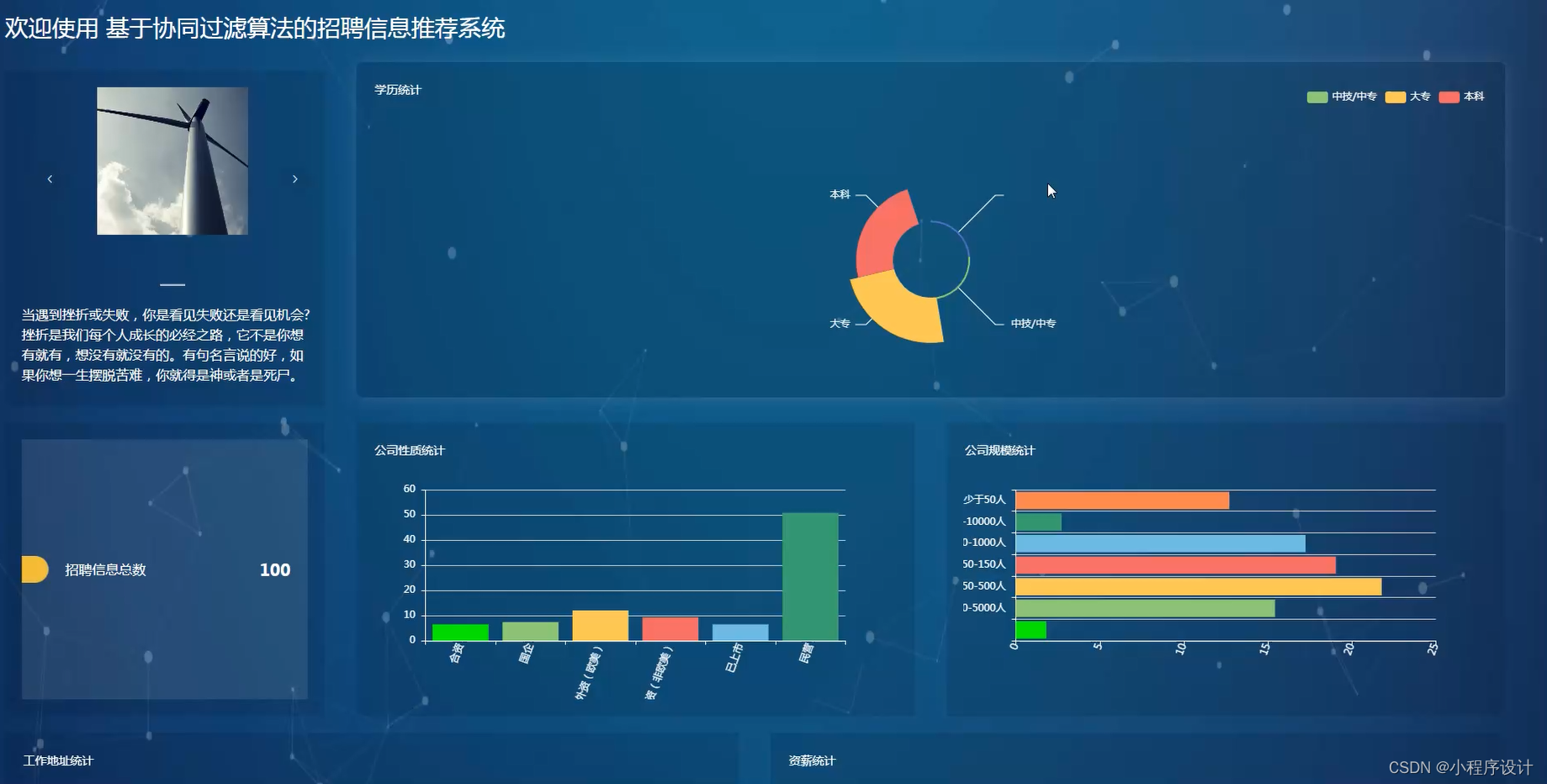
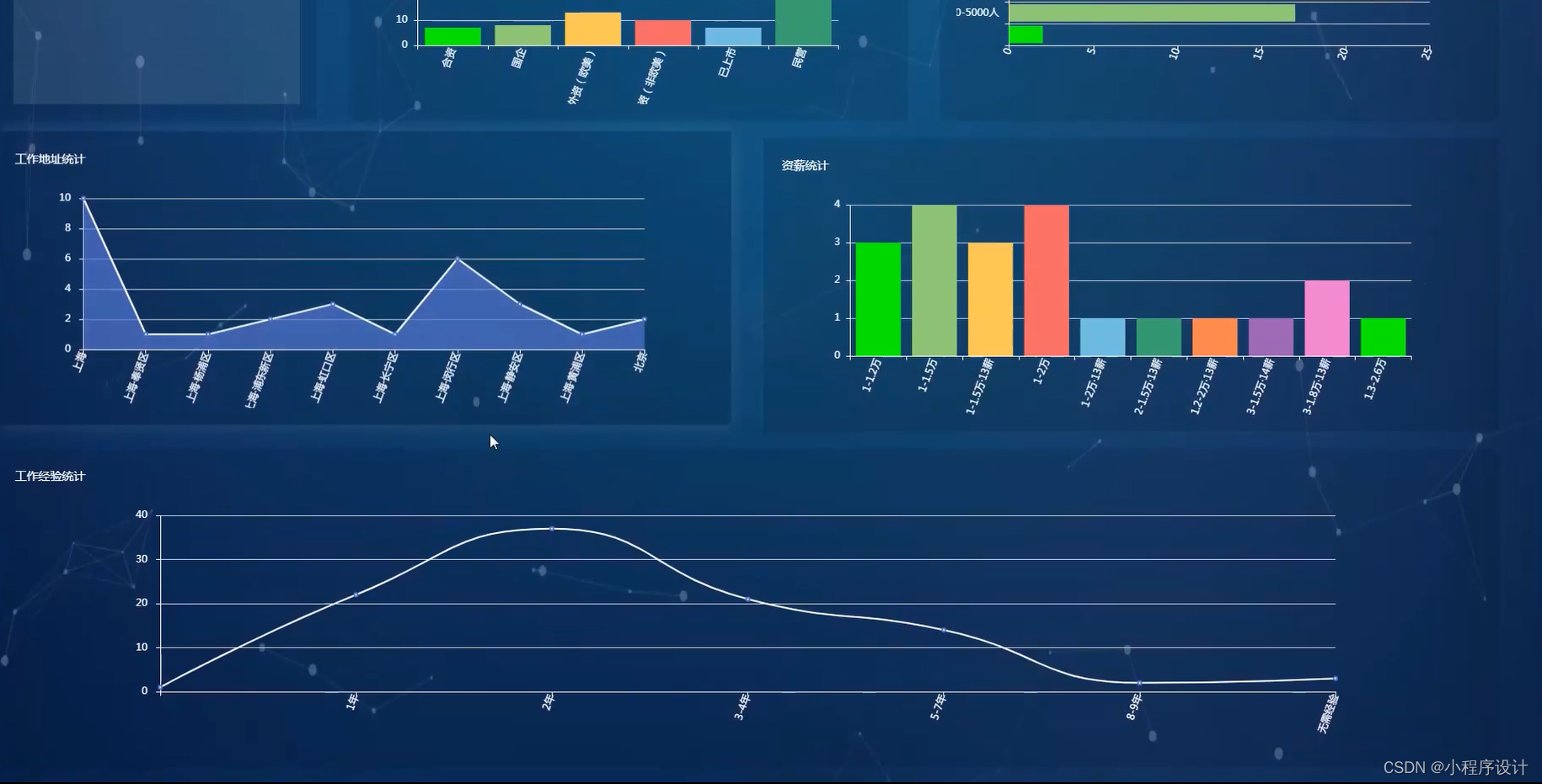
更专业的页面设计










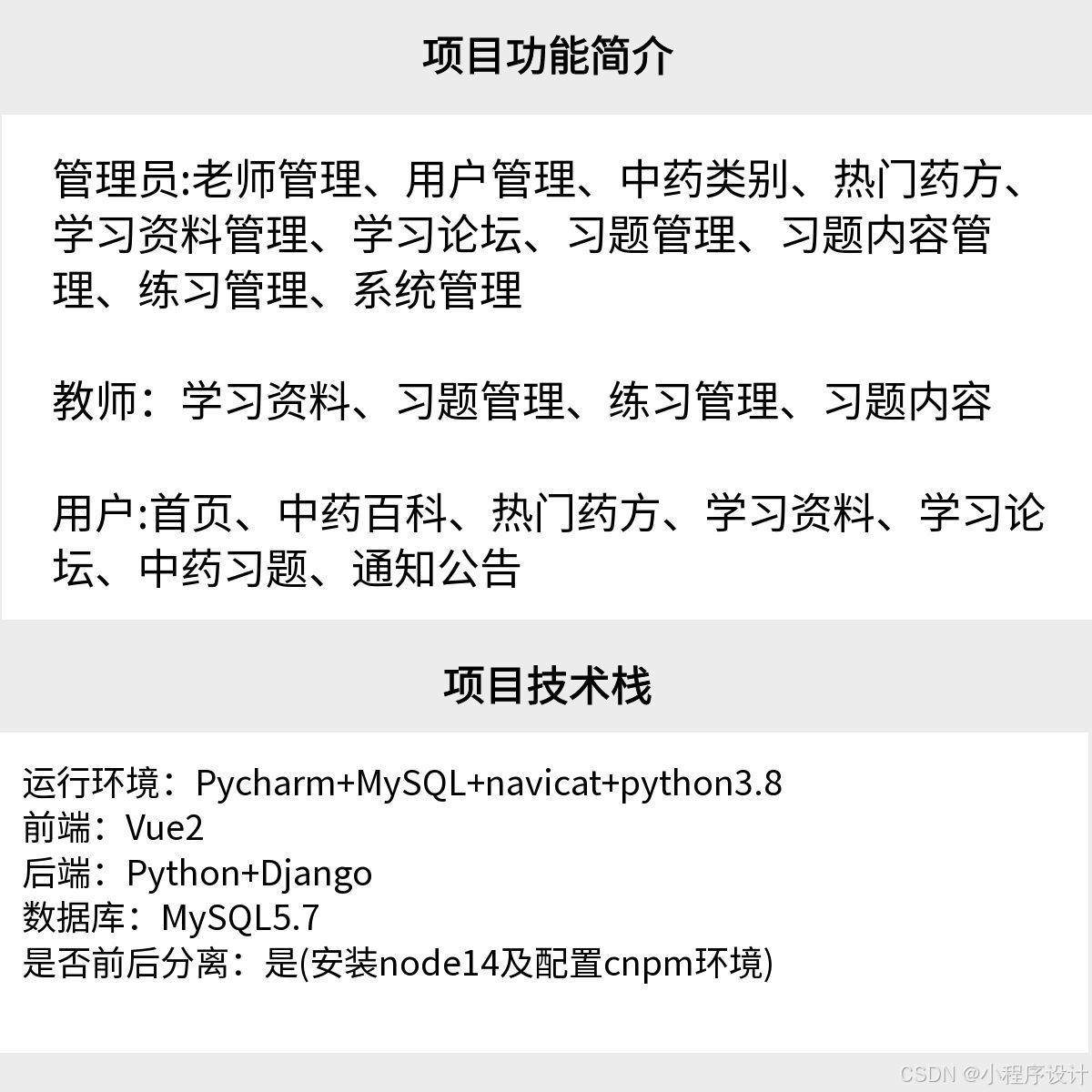
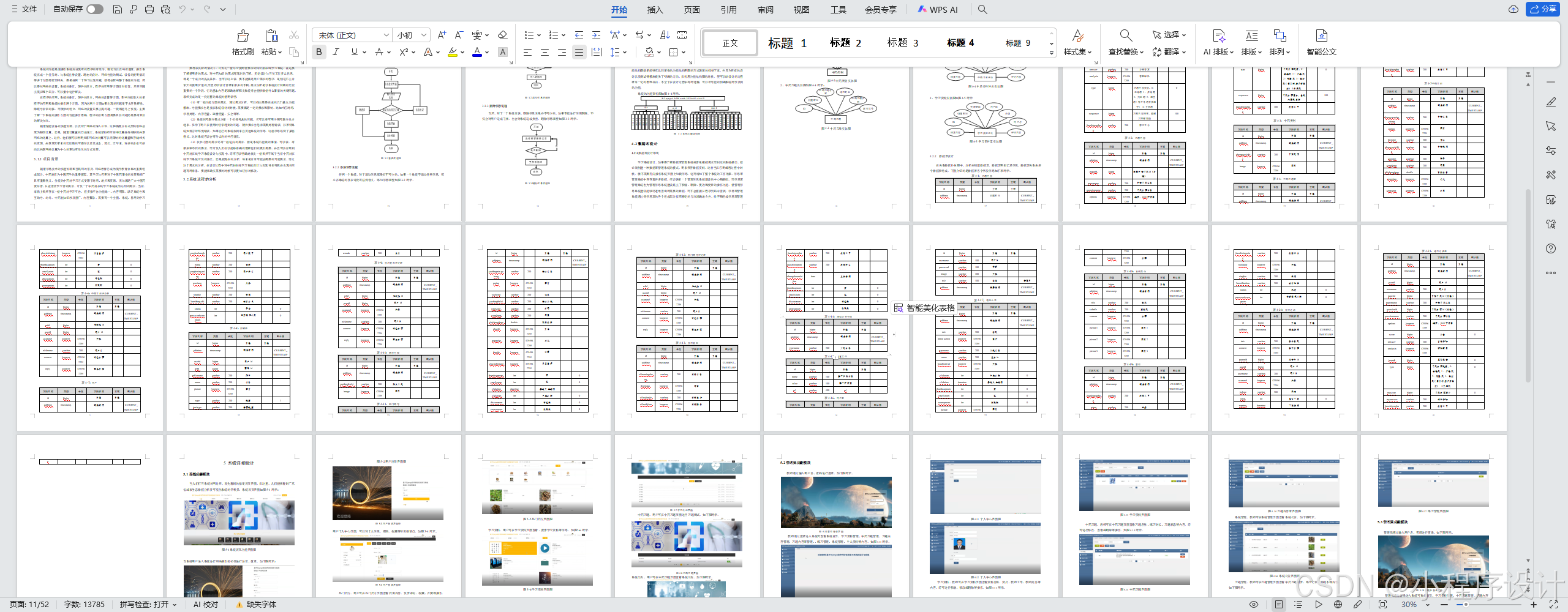
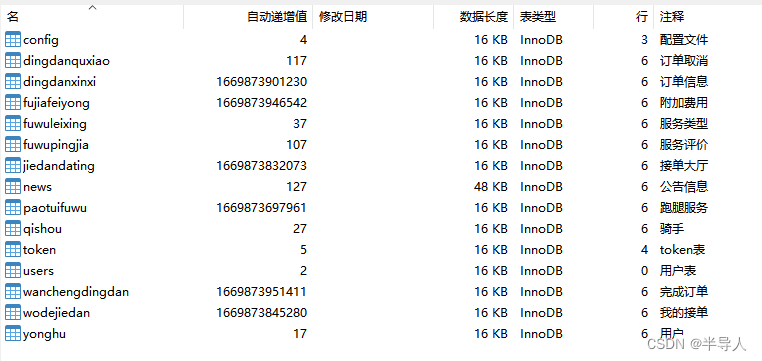

















 被折叠的 条评论
为什么被折叠?
被折叠的 条评论
为什么被折叠?








